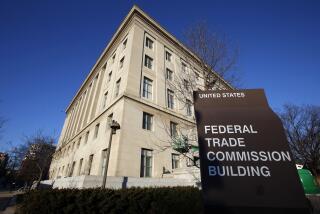SEC Turns Up the Pressure on Boiler Rooms
- Share via
NEW YORK — When the Securities and Exchange Commission this week launched its latest crackdown on small-stock scam artists, it also reminded investors of how successful regulators have been in this war.
In recent years, the SEC trumpeted, “We have locked the gate on some of the most notorious [brokerage] boiler rooms,” including A.S. Goldmen, Stratton Oakmont, Sterling Foster and A.R. Baron.
But regulators also concede that the war is far from won. Indeed, they admit their efforts have helped force criminals into new patterns.
The stock boiler room of today isn’t the classic low-rent brokerage office jammed with 100 or more salespeople making high-pressure telephone sales calls.
It’s more likely a “cottage industry,” with a sales force of telemarketers working from home, using scripts and customer lists provided by a lightly staffed central office, said Bill McDonald, enforcement chief of the California Department of Corporations, the state’s top securities regulator.
“We’ve got probably 300 boiler rooms out here,” McDonald said in an interview from his Los Angeles office, adding that most of the shops are affiliated with a handful of mastermind stock promoters.
At least a few of such kingpins were among those whose indictments and guilty pleas were announced Wednesday in San Diego in connection with a vast telemarketing fraud network, he said.
A boiler room is any shop--including licensed brokerages--that uses high-pressure telephone sales techniques to sell securities or other business “opportunities.”
Some are true “bucket shops,” which solicit investors’ cash without any intention of ever delivering a security; your sales ticket is simply tossed in a bucket with the rest of the trash.
Others sell securities in companies that do exist but tend to be tiny firms whose stock is manipulated by the promoters in “pump and dump” schemes.
The products being offered shift with the public’s taste. Five years ago, after telecommunications reform spawned a wave of high-tech start-ups, phone stocks were the boiler rooms’ hottest offerings.
Today, the Internet and Hollywood are the big buzzwords, so boiler rooms are pitching shares in snazzy-sounding Web ventures or in new movie productions, invariably touted as the next “Titanic.”
“I don’t know if people are more or less gullible today, but there’s a much larger pool of inexperienced investors,” said Indiana Securities Commissioner Bradley Skolnik, the president-elect of the North American Securities Administrators Assn., an organization of state and provincial regulators.
Technology is working for both the cops and the robbers.
This month, the National Assn. of Securities Dealers is expected to unveil a souped-up version of its database of brokers, which would enable investigators to cross-check brokers against the names of suspect firms.
That way, when McDonald receives his daily list of 200 or so brokers newly hired by California firms, he can quickly discover whether any ever worked for, say, an A.S. Goldmen or a Boston Group.
But the crooks are also honing their techniques. Many have gone “multichannel,” advertising their products on the Internet and mass-mailing coupon books, in addition to making cold calls.
William Mohr, deputy securities chief in the New York attorney general’s office, said efforts by NASD Regulation, the NASD’s regulatory arm, have at least limited the size of individual boiler room brokerages.
Using what Mohr called a “mother-may-I” approach, NASD now requires brokerages that use telemarketers to notify regulators before they increase their sales force. The technique helps NASD keep closer tabs on suspect firms.
But rather than risk additional scrutiny, many scam operators will simply open new shops under different names, Mohr said.
Despite the allure of the Net for fraud merchants, he said, there is little chance that the boiler room will pass from the scene any time soon.
Unfortunately, “There’s really no substitute for a high-pressure salesperson to get someone to put a check in an envelope and send it out,” Mohr said.
*
* BOILER ROOM BUST: A telemarketing ring that bilked investors out of $50 million is broken. C2
More to Read
Inside the business of entertainment
The Wide Shot brings you news, analysis and insights on everything from streaming wars to production — and what it all means for the future.
You may occasionally receive promotional content from the Los Angeles Times.









